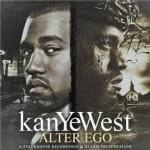
Kanye West kicks off his excellent Alter Ego mixtape with the touché of ironic gestures, specifically an introduction by — why not? — Barbara Walters. Her voice creaks open like a screen door:
“Our next guess has a unique sound, and a unique way of sounding off. He’s looking for a new artform, but he is not looking for approval.”
The artform Barbara hints at is a ying-yang of image and substance — a cosmic push-pull-push between two Kanye’s, the boastful bully versus the bashful beatmaker whose taste for aesthetic subtly squares messily with his alter ego’s taste for drama. Ms. Walters, the marble face of soft, “tell all” celebrity journalism, sets up the record as an opportunity for Kanye West the self-conscious studio artist to vent freely on Kanye West the Tabloid Creature. And that’s where the mixtape differs from the record.
Here’s Kanye the Controlling Producer talking about his evil twin, Kanye West the Reckless Celebrity: “This is my problem with interviews. You know, what if you did music and someone could come and change your words around, and then release it to the radio, and you ain’t even get a chance to listen to it before they dropped it to radio?”
In other words, Kanye’s mouth has a habit of dashing ahead of his scruples, and Alter Ego is a bit like damage control. On interludes sprinkled across the album, he addresses his most infamous moments through a series of caffeinated rants, the ad-hoc likes of which would scarcely sit well on any of his carefully-assembled major label releases. He challenges critics who say he has a “God complex”, defends his “Passion of Kanye West” Rolling Stone cover, and apologizes to the magazine’s editor for being “drunk off that drug called fame”. In a rare instance of self-deprecation, he jokes about his NAACP award, de-sensationalizes his notorious post-Katrina “Bush doesn’t care about black people” speech, then re-asserts his political MO: “I’m not really political”. (“I’m emotional. I’m social, I’m an artist […] I’m the glitch in The Matrix.”)
When he’s not toying with his celebrity, he’s toying with his back catalogue, unearthing old classics as if we forgot how 2004’s summer blockbuster “Jesus Walks” goes. His remixes are reasonably fresh — only Graduation‘s “Stronger” appears in its original, LP version. In between, he goes casio-to-casio with DMX producer Swizz Beatz in a pair of live beat battles. Swizz Beatz, the consummate producer-slash-hypeman, wins the scuffles, but the larger war is all Kanye West. Between the record’s brutal, lo-fi, bass-pumping sound and its all-star cast, it comes off like the rowdiest of creations: something hastily recorded in a guest bathroom during a house party for pop music’s biggest names, perhaps. Which isn’t a bad thing. Who but Kanye West could enlist John Mayer, Young Jeezy and Lupe Fiasco onto the same low-budget promotional disc? Kanye delegates them all, like a World Cup coach, or the Kevin Bacon of rap strategically minimizing the number of separations between Neo-Soul crooner John Legend and snarling 50 Cent protege The Game.
What’s great about a Kanye West mixtape — the reason the haphazard format works so surprisingly well for such an neurotic, detail-oriented producer — is the sense that Kanye has very little to prove here. After all, nobody ever scored a Grammy or an MTV moon man from a mixtape, and judging by Kanye West’s terrifying tendency to throw temper tantrums after awards ceremonies, he takes mainstream recognition far too seriously. Admit it: Kanye’s struggle for acclaim can occasionally make for trite, self-contained drama. But the mixtape format lets him adopt the playful, possibly intoxicated attitude of a rapper who gives his best work away for free, like a Lil Wayne, or a Papoose, or even Eminem. For instance, his preposterous “Throw Some D’s” parody — about d-cup breast implants, har har — has him flipping punchlines with an animated, almost offhand delivery that nearly diffuses the song’s thoroughly objectifying message. Weight-wise, the track would have never qualified for the album cut, and Kanye would have never qualified for that NAACP award if it had. Even his hand-out to the conscious rap fans, “Classic”, bumps with more street-level spontaneity than tangled literary craftsmanship, an unlikely achievement since it features ambling verses from wordy lyricists Nas and KRS-1.
Difficult to say which of the two Kanye West’s is his Alter, as oppose to primary, Ego. It’s tempting to peg it as Kanye West the Apologetic Artist who wakes up every morning and has to account for the headlines his extroverted doppelganger created last night — something like Jim Carrey’s Stanley Ipcus character in The Mask. But at its most joyous peaks, Alter Ego hints at the existence of an as-of-yet-undiscovered third personality, the Kanye West of Reasonable Expectations, a smooth and sublime spectacle you can only spot soaring through existence once every two thousand years, like Hale Bopp or certain sub-atomic particles. Kanye West has made, and will continue to make pop history despite himself. If only he’d stop fretting about how much.
